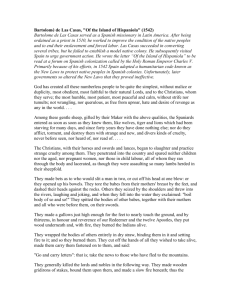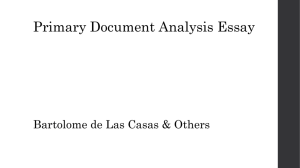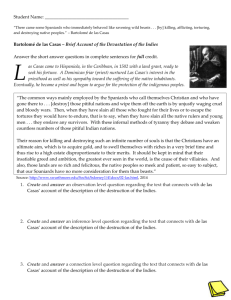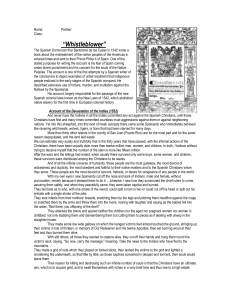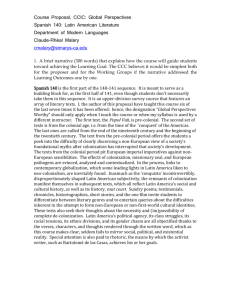Bartolomé de Las Casas-Bio
advertisement
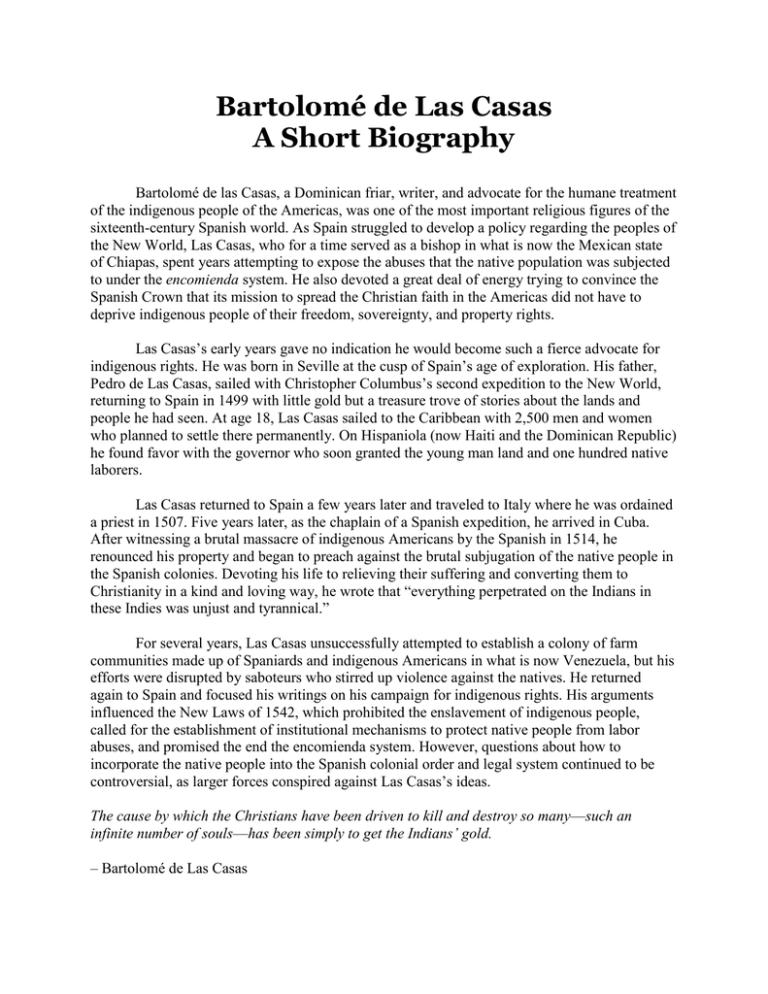
Bartolomé de Las Casas A Short Biography Bartolomé de las Casas, a Dominican friar, writer, and advocate for the humane treatment of the indigenous people of the Americas, was one of the most important religious figures of the sixteenth-century Spanish world. As Spain struggled to develop a policy regarding the peoples of the New World, Las Casas, who for a time served as a bishop in what is now the Mexican state of Chiapas, spent years attempting to expose the abuses that the native population was subjected to under the encomienda system. He also devoted a great deal of energy trying to convince the Spanish Crown that its mission to spread the Christian faith in the Americas did not have to deprive indigenous people of their freedom, sovereignty, and property rights. Las Casas’s early years gave no indication he would become such a fierce advocate for indigenous rights. He was born in Seville at the cusp of Spain’s age of exploration. His father, Pedro de Las Casas, sailed with Christopher Columbus’s second expedition to the New World, returning to Spain in 1499 with little gold but a treasure trove of stories about the lands and people he had seen. At age 18, Las Casas sailed to the Caribbean with 2,500 men and women who planned to settle there permanently. On Hispaniola (now Haiti and the Dominican Republic) he found favor with the governor who soon granted the young man land and one hundred native laborers. Las Casas returned to Spain a few years later and traveled to Italy where he was ordained a priest in 1507. Five years later, as the chaplain of a Spanish expedition, he arrived in Cuba. After witnessing a brutal massacre of indigenous Americans by the Spanish in 1514, he renounced his property and began to preach against the brutal subjugation of the native people in the Spanish colonies. Devoting his life to relieving their suffering and converting them to Christianity in a kind and loving way, he wrote that “everything perpetrated on the Indians in these Indies was unjust and tyrannical.” For several years, Las Casas unsuccessfully attempted to establish a colony of farm communities made up of Spaniards and indigenous Americans in what is now Venezuela, but his efforts were disrupted by saboteurs who stirred up violence against the natives. He returned again to Spain and focused his writings on his campaign for indigenous rights. His arguments influenced the New Laws of 1542, which prohibited the enslavement of indigenous people, called for the establishment of institutional mechanisms to protect native people from labor abuses, and promised the end the encomienda system. However, questions about how to incorporate the native people into the Spanish colonial order and legal system continued to be controversial, as larger forces conspired against Las Casas’s ideas. The cause by which the Christians have been driven to kill and destroy so many—such an infinite number of souls—has been simply to get the Indians’ gold. – Bartolomé de Las Casas In 1550, at the request of the King, Las Casas participated in a debate about the treatment of the indigenous people with Juan Ginés de Sepúlveda, a leading Spanish scholar, at the Council of Valladolid. The objective of debate was to discuss the intellectual and religious capacities of the native people, questions that were tied to the larger issue of the right that Spaniards had to make war upon them, rule over them, and to take over their properties. Sepúlveda argued that the Indians were “natural slaves” (an Aristotelian concept that posited that there are people who by their nature or lack of rational capacities are born to be ruled by others) and that it was therefore legitimate to reduce them to slavery or serfdom. His arguments were popular among the colonists and landowners who benefited from the system in Spanish America, while members of the monarchy and the Catholic Church tended to side with Las Casas, in part because they wanted to decrease the power of the encomenderos. The debate, which lasted for five days, was declared a draw by the judges, and did not have a clear outcome or effect on the treatment of the native population. Las Casas’s ideas, however, had already left their mark on the New Laws of 1542 and helped to bring about the decline of the encomienda system. After the debate, Las Casas returned to writing and spent the rest of his life fighting for the rights of the indigenous peoples of the Americas. He inadvertently helped to ignite a propaganda campaign against Spain known as the “black legend” when his Short Account of the Destruction of the Indies (1552), a searing indictment of Spanish greed and brutality in the New World, reached Europe and was used by the country’s adversaries as evidence of Spanish ruthlessness. Historians from England, France, the Netherlands and elsewhere used the book to vilify Spain. A Short Account of the Destruction in the Indies Bartolome de Las Casas Written in 1552, the Short Account was meant as a warning to the Spanish king, in the hope that he would save the Americas before it was too late. De Las Casas, who had been there from the beginning, understood all too well what the Europeans had wrought: God made all the people of this area, many and varied as they are, as open and as innocent as can be imagined. The simplest people in the world -- unassuming, long-suffering, unassertive and submissive -- they are without malice or guile and are utterly faithful and obedient both to their own native lords and the Spanish in whose service they now find themselves ... It was upon these gentle lambs, imbued by the Creator with all the qualities we have mentioned, that from the very first day they clapped their eyes on them the Spanish fell like ravening wolves upon the fold, or like tigers and savage lions who have not eaten meat for days. The pattern established at the outset has remained unchanged to this day, and the Spanish still do nothing save tear the natives to shreds, murder them and inflict upon them untold misery, suffering and distress, tormenting, harrying and persecuting them mercilessly ... When the Spanish first journeyed there, the indigenous population of the island of Hispaniola stood at some three million; today, only two hundred survive. The island of Cuba, which extends for a distance almost as great as that separating Valladolid from Rome, is now to all intents and purposes uninhabited; and two other large, beautiful and fertile islands, Puerto Rico and Jamaica, have been similarly devastated. Not a living soul remains today on any of the islands of the Bahamas, which lie to the north of Hispaniola and Cuba, even though every single one of the sixty or so islands in the group, as well as those known as the Isles of Giants and others in the area, both large and small, is more fertile and more beautiful than the Royal Gardens in Seville and the climate is as healthy as anywhere on earth. The native population, which once numbered five hundred thousand, was wiped out by forcible expatriation to the island of Hispaniola, a policy adopted by the Spaniards in an endeavor to make up the losses among the indigenous population of that island ... A further thirty or so islands in the region of Puerto Rico are also now uninhabited and left to go to rack and ruin as a direct result of the same practices. All these islands, which together must run to over two thousand leagues, are now abandoned and desolate. On the mainland, we know for sure that our fellow country-men have, through their cruelty and wickedness, depopulated and laid waste an area which once boasted more than ten kingdoms, each of them larger in area than the whole of the Iberian Peninsula. The whole region, once teeming with human beings, is now deserted over a distance of more than two thousand leagues: a distance that is greater than the journey from Seville to Jerusalem and back again.
